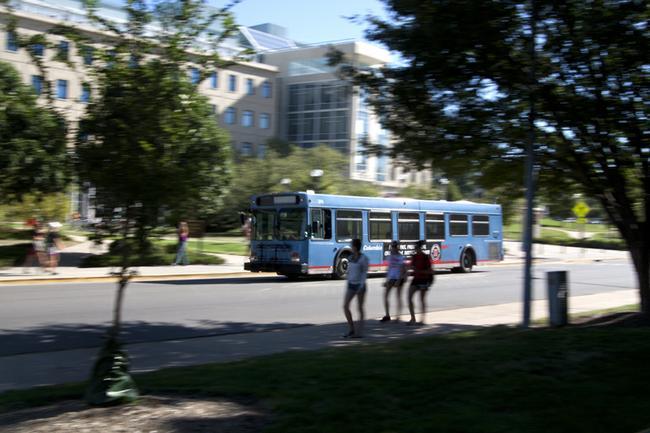In a public budget session Monday night to discuss the suggested $2.7 million in cuts from Columbia Transit’s combined bus replacement and operating budget, Mayor Bob McDavid proposed a partnership with MU that would redefine the future transit system.
This partnership would consist of a task force that is primarily driven by student input on what kind of transit system they would want and use, according to the City Council presentation viewed at Monday night’s meeting.
“Students are the backbone to the transit system,” First Ward Councilman Fred Schmidt said. “Students will be asked what they want and if the bus system becomes good enough, they can pay one fee and not have to worry about parking or how they will get home at night.”
Schmidt said he is begging his constituents to accept proposed funding cuts for the city’s bus system in light of a greater vision for the future. All of the proposed cuts will officially be voted on Oct. 1.
“The (transit) cuts are terrible, but I’m asking the city to deal with the cuts and see the rainbow at the end, which will be designed by the people using the transit system, specifically the students,” Schmidt said.
Suggestions for this new transit system include daily service, evening “sober chauffer” routes and allowing students to ride for free at the farebox.
“At most university communities, students pay a fee and get a bus pass to ride anywhere free for a semester,” Sixth Ward Councilwoman Barbara Hoppe said. “The goal is good bus service and routes so the university doesn’t have to build more parking and students save money.”
Public Works spokeswoman Jill Stedem said while it was too late to find a solution for the fiscal year 2012 budget, the city will make every effort to work with the task force to come up with a solution for future years that will expand Columbia Transit.
**Transit cuts and MU**
Cuts for transit in the proposed budget include reductions in the amount of miles covered on routes such as 207 Gold and 209 Black, which cater to students living off campus, elimination of weekend evening services and increased fares.
Eliminating football shuttles that service routes to the stadium on game days is also under consideration. This would save $7,470 in expense reductions, according to the City Council’s presentation.
Discussions are currently pending with the MU athletics department and the Convention and Visitors Bureau about possible funding for the shuttles this fall, Stedem said.
College students make up 74 percent of all transit ridership, according to the City Council presentation. Thirty-six percent of that ridership pertains to the Black and Gold Routes and the remaining 38 percent consists of campus shuttles.
Apartment complexes that house off-campus students along the Gold and Black routes, such as The Reserve and Campus Lodge on Old 63 South, were notified in early August that the buses serving their students may no longer be available after the proposal passes.
“Our community is unhappy with the late notification regarding the cancellation of the weekday Black route service and the lack of communication from the city of Columbia,” said Michael Davis, Regional Vice President for Ambling Student Housing, the management company for Campus Lodge. “We hope a resolution can be reached in order to accommodate our residents.”
Krista Pulley, a sophomore living at Campus Lodge, said the loss of bus service would hinder her ability to get to campus.
“I don’t have a car and would have to ask around to find rides,” Pulley said. “We found out the Friday before we moved in that the buses would stop (servicing our apartments). Now I’m wishing I had lived on campus this year.”
Campus Lodge is currently working with the city of Columbia in an attempt to negotiate additional hours of service, Davis said. Campus Lodge has partnered with the Reserve to try to reinstitute the route.
The Reserve declined to comment on the reduction of transit services to its apartment complexes.
The Pointe on Rock Quarry Road is also discussing a contract with Columbia Transit to provide bus transportation to their tenants, Stedem said. Transit has submitted a contract to Log Hill Run Apartment Complex on South Providence Road but has not heard from it yet.
“The council doesn’t want to see anyone suffer from the loss of coverage area,” Second Ward Councilman Jason Thornhill said. “But the key issue to remember if that if we do not find a way to stop the severe loss of revenue afflicting the transit system … the utility will go broke.”
A shuttle to Tiger Diggs, a part of the university’s extended campus located at Campus View apartments, will not be affected by the transit cuts, said Kristen Temple, associate director of residential academic programs.
“The shuttles are a contracted service between the university and the city,” Temple said. “The university pays the cost out of student fees to run the shuttle.”
**Finalizing the budget**
The City Council will meet for work sessions Sept. 6 and 19 to finalize the city budget and will vote on it Sept. 19. The changes would go officially into affect Oct. 1 if the budget is approved.
“City Council and staff feel strongly these budget adjustments are short term,” Stedem said. “More viable solutions for revenue will be explored over the next year to make Columbia Transit even better for the future.”
Schmidt agrees that though there is a tough year ahead, the future for transit is hopeful.
“I feel optimistic,” Schmidt said. “We would never take such a risk without hope for a brighter future. It all comes down to the students and what they want in transit. We are counting on them to come up with something brilliant.”







